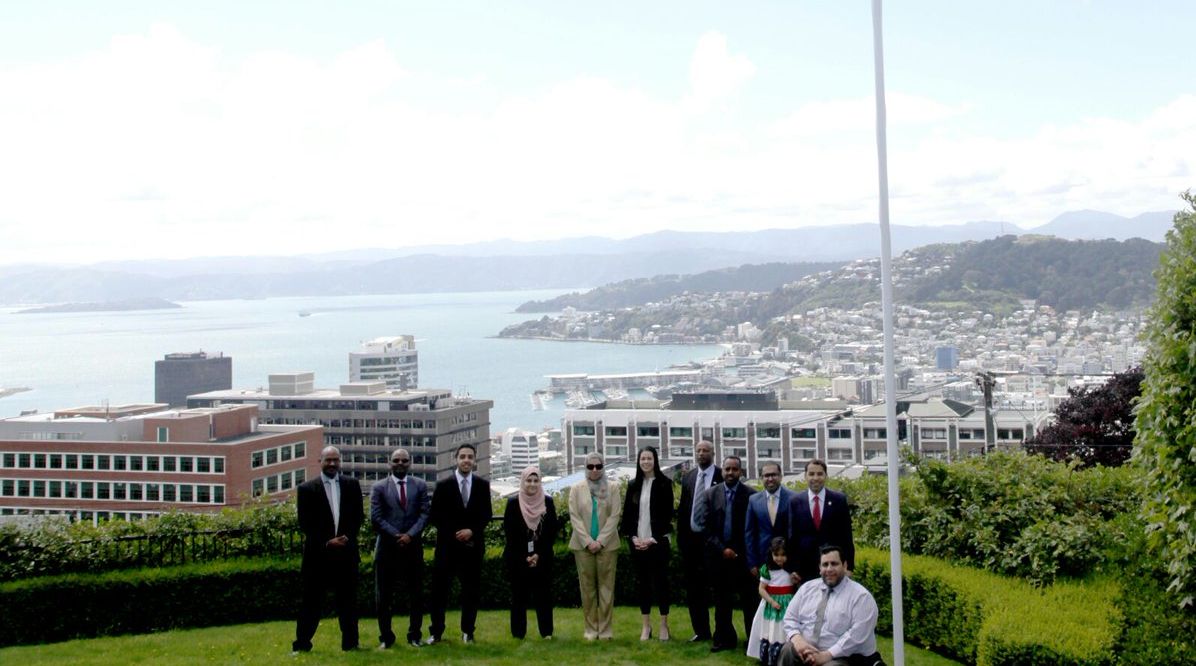The National Emergency Crisis and Disasters Management Authority (NCEMA) and the New Zealand Embassy in the UAE recently organised a virtual interactive panel discussion about the COVID-19 pandemic. The panel discussion saw the participation of Matar Ali Al Mansouri, Charge d’Affairs at the UAE Embassy to New Zealand; Matthew Hawkins, New Zealand Ambassador to the UAE; and a number of leading officials and academics from both countries.
During the session, the panel underlined the UAE and New Zealand's proactive response to COVID-19 across various sectors. It further highlighted the efforts made by both countries and lessons learned from the repercussions of the pandemic.
Participants took a review of the ongoing developments in the global fight against COVID-19 and preventive and precautionary measures implemented by both countries to curb the virus spread. They also reviewed the joint action measures taken by the UAE and New Zealand to address the developments and challenges posed by COVID-19 repercussions.
In addition, panelists discussed key efforts and issues in the national response strategy in both countries against COVID-19, including medical research and health sciences, emergency and crisis management. as well as research and studies of disaster science.
In his address at the panel discussion, Dr. Saif Al Daheri, Spokesman for NCEMA, said the UAE has a national response strategy that led to strengthening the country's leading position in numerous indicators of handling the COVID-19 pandemic and addressing its ramifications efficiently and professionally with the help and support of relevant sectors.
Dr. Al Daheri noted that solidarity and community awareness during COVID-19 while following precautionary and preventive protocols served as a crucial motivation for national efforts to successfully address pandemic repercussions and overcome social and health challenges.
On her part, Sarah Stuart Black, Secretary-General of the New Zealand Red Cross and former Director of Civil Defence and Emergency Management at the National Emergency Management Agency, said that the ‘stay at home’ message at the onset of the outbreak significantly helped in reducing the number of cases along with necessary precautionary measures that were put in place by the UAE government to ensure health and safety of the community during the crisis.
Ali Rashid Al Neyadi, Director of Operations Management at NCEMA, spoke about the national efforts made by all relevant entities and successful management of the COVID-19 crisis by the UAE leadership. Al Neyadi discussed the UAE leadership's efforts to provide medicine and food to people in need and prioritise human health during the pandemic.
Al Neyadi stated that the UAE leadership's clear vision and strategy for crisis management facilitated successful handling of challenges posed by the pandemic. He went to acknowledge the support and cooperation provided by all sides to overcome the challenges and handle the crisis. Making effective use of national plans and frameworks to deal with the pandemic helped in achieving this success. Al Neyadi further emphasised the documentation of all procedures and operations carried out by the state at both local or national levels.
He underlined the significance of the strategic sector balance approach, particularly during the planning of recovery from the crisis. He also lauded the support provided by vital sectors in boosting the efforts of the country's health sector, most importantly, education, society, aviation, security, and economic sectors. The UAE formed the National COVID-19 Crisis Recovery Management and Governance Committee to enhance the strategic balance in the state amid the crisis, he added.
Later during the discussion, Dr. Siouxsie Wiles, Assistant Professor at the University of Auckland, stressed the importance of imposing precautionary measures during the closure period that significantly helped in reducing the spread of the virus. She spoke about the work she had done with New Zealand illustrator Toby Morris to elucidate the details about the pandemic and need for precautionary measures in preventing the spread of COVID-19. She also highlighted the need for vaccines in curbing the spread of the pandemic.
Dr. Farida Al Hosani, the Spokesman for UAE's Health Sector, explained the UAE's proactive response to ensuring the health and safety of the community. In this regard, she highlighted the UAE is administering the COVID-19 vaccine free of charge to all people across the country to ensure equitable distribution of vaccines across different segments of society.
She noted that the UAE is leading several countries globally in terms of the number of COVID-19 tests conducted and its active role in clinical trials of a number of vaccines. It facilitated a rapid adoption of a number of COVID-19 vaccines across the world while following a scientific and orderly approach. It also helped in efficiently addressing the pandemic and supporting international efforts to overcome its repercussions on humanity.
Dr. Maureen Mooney, a research officer in psychology and sociology at Massey University, underlined the vital role played by psychological support to community members during COVID-19 in integrating efforts to address its ramifications. Dr. Mooney also stressed the importance of raising public awareness by providing crucial scientific and health information in order to overcome the psychological impact of the pandemic crisis.
Matthew Hawkins, New Zealand Ambassador to the UAE, said even though New Zealand and the UAE implemented different approaches to address COVID-19, both countries won praised internationally for the positive success of their scientific response and effective management of the pandemic.
Underlining the success of UAE’s vaccination program, Ambassador Hawkins noted that the UAE had achieved the 17th rank along with New Zealand in 16th place in the Brand Finance Soft Power rankings for 2020. Ambassador Hawkins affirmed that both New Zealand and UAE's success in pandemic management served as a key factor in their rise on the index.
WAM
 AR
AR UR
UR
